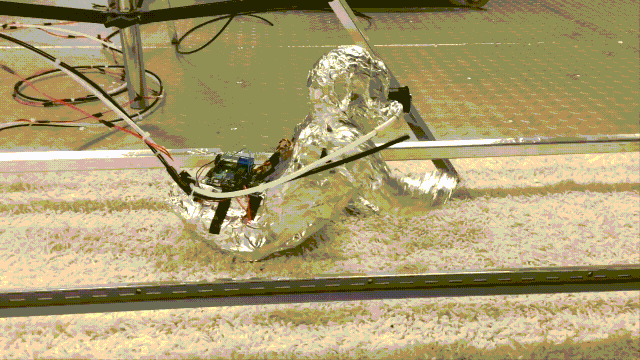To the untrained eye, babies are nothing more than drooling, crying blobs who do basically nothing all day. But a recent study published in Environmental Science & Technology has found that babies are actually drooling, crying blobs who stir up impressive clouds of bacteria, dirt, fungi and bug bits wherever they crawl. And all it took to figure this out was creating a foil-covered robot baby.
Researchers, primarily at Purdue University, designed an elaborate experiment to test how babies disturb the ground beneath them while moving. They made a foil-wrapped, legless robot that mimicked a baby crawling on its belly, then had the little monster wobble its way down long patches of carpet taken from actual homes. An adult volunteer walked along the same patch for comparison. The germs and debris sent flying by the robobaby’s crawling was made visible by a nifty laser device, and nearby filters collected air samples.
“We used state-of-the-art aerosol instrumentation to track the biological particles floating in the air around the infant in real-time, second by second,” explained lead author Brandon Boor, a civil engineer at Purdue, in a statement. “The instrument uses lasers to cause biological material to fluoresce. Most bacterial cells, fungal spores, and pollen particles are fluorescent, so they can be reliably distinguished from non-biological material in the air.”
Boor and his colleagues found that their baby could generate a cloud of debris as much as 20 times larger than the amount normally seen in a room. And they estimated that – per every kilogram of weight – a baby could inhale up to four times more of these “fluorescent biological aerosol particles” than an adult would while moving, thanks to the baby being low to the ground and more often breathing through the mouth. Adults, on the other hand, are better at self-cleaning, thanks to our fully developed nostrils and throats that trap particles before they reach the lungs.
Scary as that might sounds, though, there’s actually a leading theory among scientists that the more dust and microscopic bugs we’re exposed to growing up, the better off we’ll ultimately be.
According to this theory, known as the hygiene hypothesis, our immune system needs plenty of minor foes to face off against in its formative years in order to calibrate itself. Without this exposure, it can instead become overly sensitive, leading to allergies and asthma in children. Indeed, studies have found that people growing up in “dirtier” environments, such as a farm, a home with (some) pets, or even a home with more cockroaches, are less likely to have autoimmune disorders. This effect might be the major reason why Western countries have far higher rates of asthma and allergy than the developing world, where things such as intestinal worms are much more common.
“Exposure to certain bacterial and fungal species can result in the development of asthma, but numerous studies have shown that when an infant is exposed to a very high diversity of microbes, at a high concentration, they can have a lower rate of asthma later in life. Such exposures act to stimulate and challenge your immune system,” Boor said.
More recently, though, many scientists have called for a rebranding of the hygiene hypothesis. Not because it’s necessarily untrue, but because the term can be easily misunderstood by the public. You don’t need to stop regularly giving your kids – robot or not – a bath or a check-up by their paediatricians to keep their immune systems in tip-top shape. As this current study suggests, all you might need to do is let them roll around and explore the world some.
